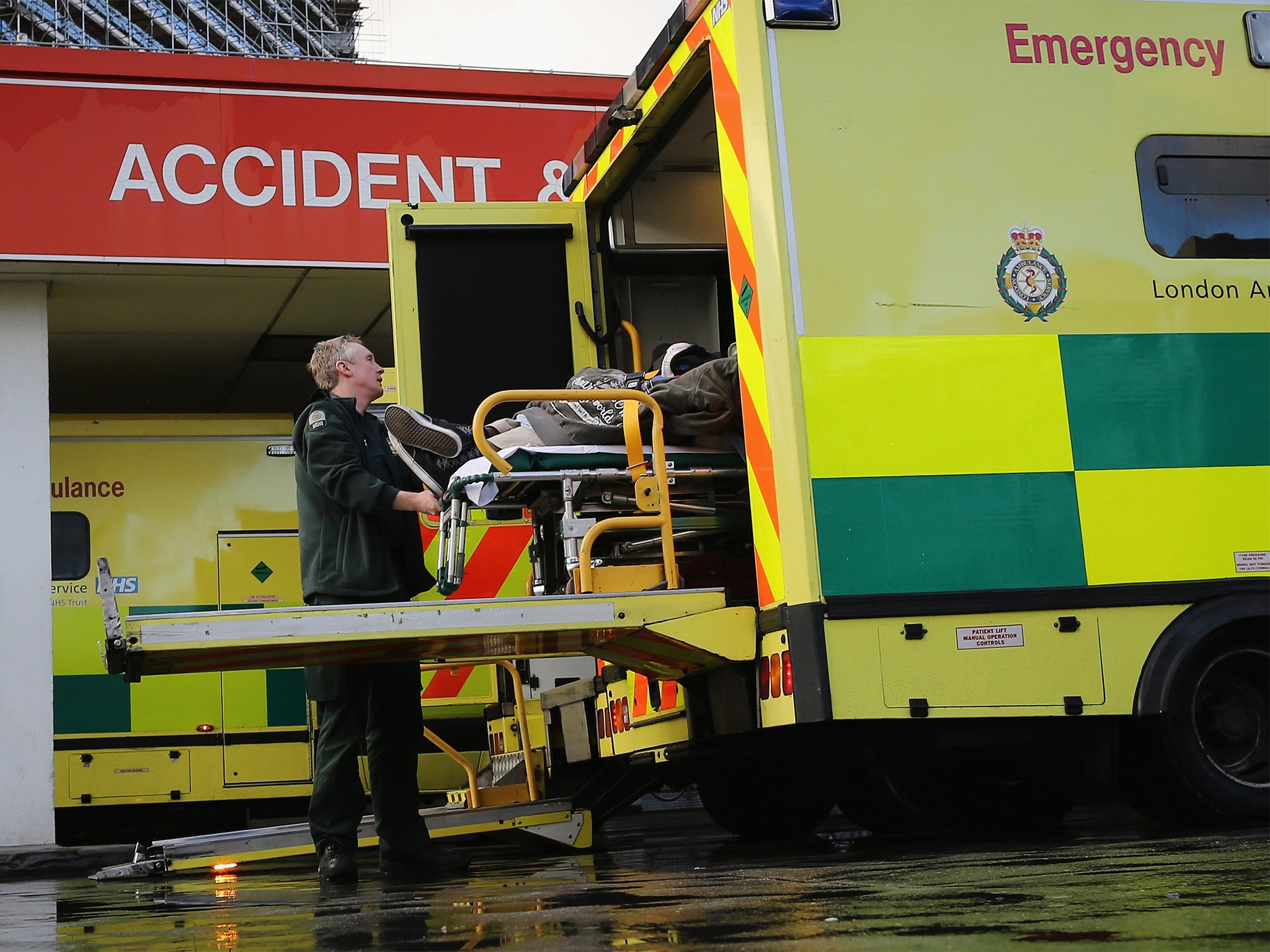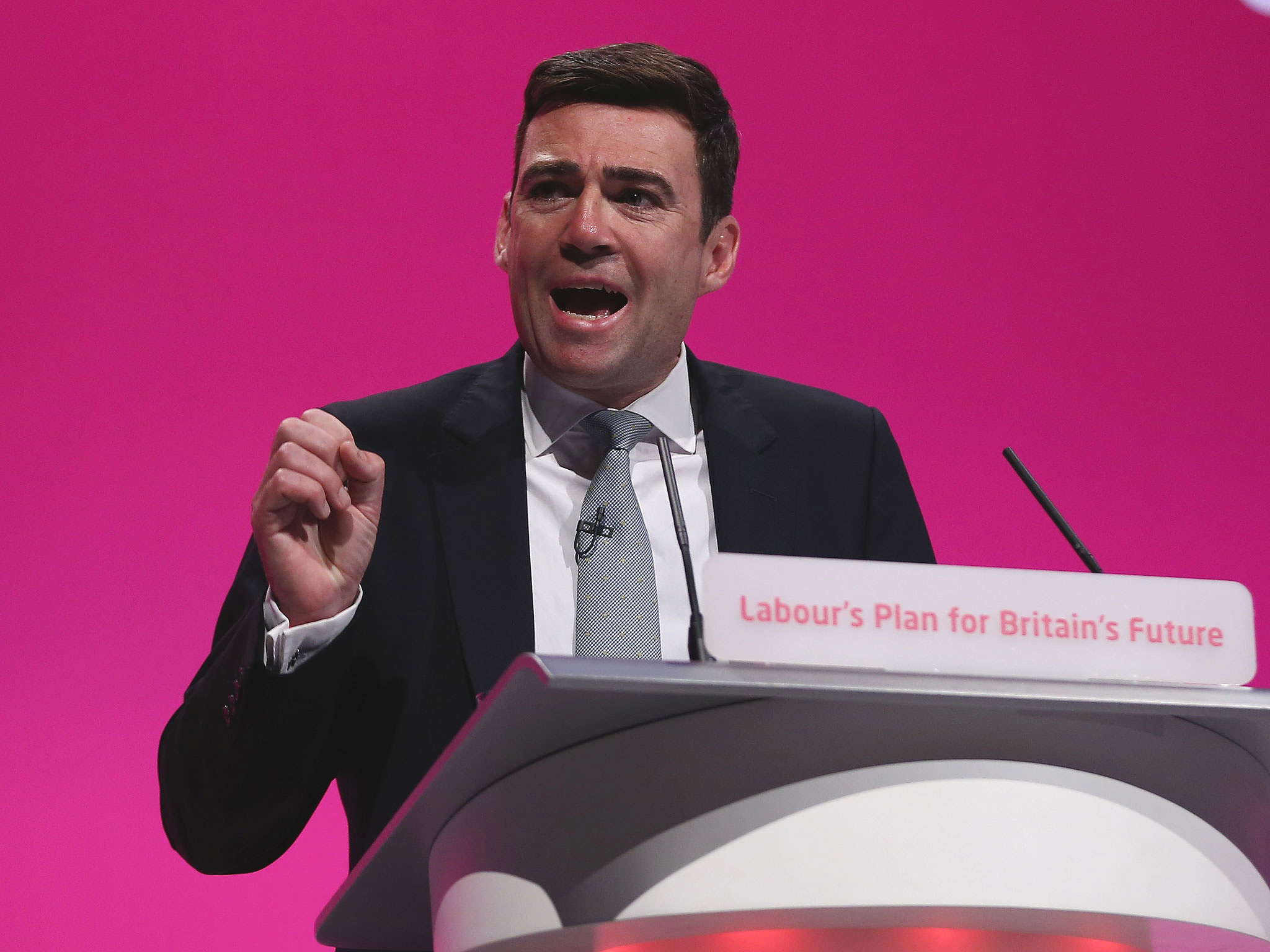NHS in critical condition as A&E waiting times are worst in a decade
Record number of hospital declare 'major incidents', as operations and outpatient appointments are cancelled

Your support helps us to tell the story
From reproductive rights to climate change to Big Tech, The Independent is on the ground when the story is developing. Whether it's investigating the financials of Elon Musk's pro-Trump PAC or producing our latest documentary, 'The A Word', which shines a light on the American women fighting for reproductive rights, we know how important it is to parse out the facts from the messaging.
At such a critical moment in US history, we need reporters on the ground. Your donation allows us to keep sending journalists to speak to both sides of the story.
The Independent is trusted by Americans across the entire political spectrum. And unlike many other quality news outlets, we choose not to lock Americans out of our reporting and analysis with paywalls. We believe quality journalism should be available to everyone, paid for by those who can afford it.
Your support makes all the difference.There are grave doubts over the NHS’ capacity to cope with ever-growing demand this winter after emergency departments recorded their worst week in a decade, and more than a dozen hospitals were forced to implement “major incident” emergency plans.
Despite mild weather and without a serious outbreak of seasonal illness, this week at least 15 hospitals in England have had to cancel operations, call in extra staff or limit A&E services to only severely ill or injured patients.
The Government has blamed the drastic decline in hospital performance on growing numbers of frail, older patients, but charities supporting the elderly, including Age UK and Independent Age, said that cuts to council care budgets were now having a knock-on effect upon the NHS.
The warnings came as:
* Latest NHS England figures showed that 92.6 per cent of patients were seen in four hours at England’s A&Es and minor injury units from October to December 2014 – below the 95 per cent target and the worst performance in a decade.
*Only 83.1 per cent of patients were seen in four hours at major A&Es in the week before Christmas – the worst week on record.
*12 hospitals in England declared major incidents, and three others significant incidents, because of pressures on A&E and bed capacity
* Hospitals and ambulance services had to take drastic measures to meet demand. South Western Ambulance Services erected a temporary treatment tent in the grounds of Great Western Hospital in Swindon as a “precautionary measure”, and a fire engine was used to transport a patient to hospital in York.
Hospitals around the country are now telling patients not to visit the A&E unless they are facing an emergency. Although unprecedented numbers have declared major incidents, many others have cancelled operations or called in extra resources.
Delays are being blamed on an influx of patients, with reports that levels of flu and chest infections are beginning to rise. However, long delays are also reported in transferring elderly patients out of hospital and into community care, causing hold-ups all the way back to the A&E door.
Latest figures show that in December, nearly 39,000 sick patients were forced to wait on trolleys for up to 12 hours after a decision to admit them to hospital – three times as many as last year.
The number of delayed transfers of care is up 20 per cent, NHS England’s director for acute episodes Professor Keith Willett said. He added that delays may be down to availability of care home places or social care packages.
“Obviously social care services have taken a substantial reduction in funding in recent years whereas the NHS, albeit not having any growth in funding, has had its core budget protected,” he told BBC Radio 4’s World At One.
Latest figures have not been released on A&E performance in Scotland and Wales, but many hospitals have reported severe pressures.
Jeremy Hunt, the Health Secretary, paid tribute to NHS staff, “busting a gut”, and said that the number of frail elderly patients requiring hospital care was the “key problem” facing the NHS.

“If you’re over 80 and you turn up at an A&E department, the chances are you won’t go home, you’ll be admitted to the hospital and you’ll probably stay in the hospital for a very long time… across the country [people] are saying that is the key problem because many of those people would be better looked after at home,” he told Sky News.
Mr Hunt added that NHS chief executive Simon Stevens’ five-year plan could resolve the problem, with greater investment in GP care in the community.
However, Labour’s Shadow Health Secretary Andy Burnham said that the Coalition Government’s council budget cuts had a created “a crisis in social care” that was “dragging down the NHS”.
“We have record numbers of older people trapped in hospital who can’t go home because the nursing home places aren’t there or care in the home isn’t there,” he told the BBC. “Because wards are staying full, A&E can’t admit to the ward, pressure is backing up through A&E and ambulance services can’t hand over patients at A&E. That is the root cause of what we are facing right now.”
Caroline Abrahams, charity director of Age UK, said social care services were “overwhelmed”, meaning that older people were more likely to end up in A&E and stay in hospital for longer.
“Politicians on all sides must recognise that there can be no long term solution to the NHS winter crisis until Government investment in social care – in the form of its central grant to councils – significantly rises,” she said.
Janet Morrison, chief executive of Independent Age, said that cuts to social care budgets “mean fewer frail elderly patients receive the support they need to stay out of hospital”.

Chris Ham, chief executive of the influential King’s Fund think-tank said that the country’s health and social care system was now “fundamentally broken”.
“What is needed is a single system in which primary, community and hospital care work together to provide services that effectively meet the needs of the population,” he said.
Dr Clifford Mann, president of the College of Emergency Medicine, warned that A&Es were still understaffed and that “exit block” caused by a lack of hospital beds and delays in discharging patients risked safety of patients at the emergency department, adding that in some cases “mortality increases” because of heightened pressures.
Case study: ‘I almost lost my foot’ long wait for ambulance
Rugby player Luigi Segadelli had to wait three hours lying face-down on a soggy pitch for an ambulance on Saturday after breaking his leg during a match. Mr Segadelli, 30, waited so long, paramedics told him he was in danger of losing his foot, which began to turn blue.

I was cold and shaking. When the paramedics saw how long it was taking to get colour back into my foot they said I had been in the cold so long there was a risk of losing my foot. That’s when I started panicking.”
Mr Segadelli broke his tibia and fibula while playing for Morriston RFC in Swansea and the game was called off. His teammates covered him with blankets as they waited for an ambulance which did not arrive until almost 6pm, by which time the floodlights had to be turned on.
“When we finally got to the hospital, I was pretty out of it but I did notice how incredibly busy A&E was. To be fair, the paramedics and all the hospital staff were brilliant and treated me really well once the ambulance arrived. It was just the wait that was so annoying.”
The Welsh Ambulance Service said emergency demand was unprecedented and they were unable to respond to some calls in the time they would have liked.
Mr Segadelli, added: “I want an apology for the delay – they must have the decency to make sure it does not happen to anyone else again.”
Hospitals that have declared major incidents or faced extreme pressures so far this winter
Major incident plans are put in place when patient demand reaches a point that threatens the delivery of hospital service. Bed capacity may have been reached, or may be near being reached. Resources are redirected to A&E and to discharging patients in order to free up beds. Routine operations are cancelled and extra agency staff can be drafted in.
1 Aberdeen Royal Infirmary:
Up to 20 operations postponed and patients being redirected to GPs2 Scarborough Hospital: Declared on Monday afternoon
3 Royal Bolton Hospital: Declared yesterday
4 Royal Stoke University Hospital: Declared late on Monday
5 Stafford Hospital: Declared late on Monday
6 Walsall Manor Hospital: Declared yesterday
7 Peterborough City Hospital: Declared on Monday
8 Norfolk and Norwich Hospital: Declared a major incident on New Year’s Eve, then reinstated the measures yesterday
9 Bedford Hospital: ‘Significant’ incident declared yesterday
10 Morriston Hospital: Patients warned of long waits and urged not to visit for minor illnesses
11 Princess of Wales Hospital: Patients warned of long waits and urged not to visit for minor illnesses
12 Gloucestershire Royal Hospital: Declared on Monday, for second time in a month
13 Cheltenham General Hospital: Declared on Monday, for second time in a month
14 Ashford Hospital: Declared late on Monday
15 St Peter’s Hospital: Declared late on Monday
16 Croydon University Hospital: Declared yesterday
17 Princess Royal Hospital: ‘Significant’ incident declared on Monday, some operations cancelled
18 Royal Sussex Hospital: ‘Significant’ incident declared on Monday, some operations cancelled
Join our commenting forum
Join thought-provoking conversations, follow other Independent readers and see their replies
Comments